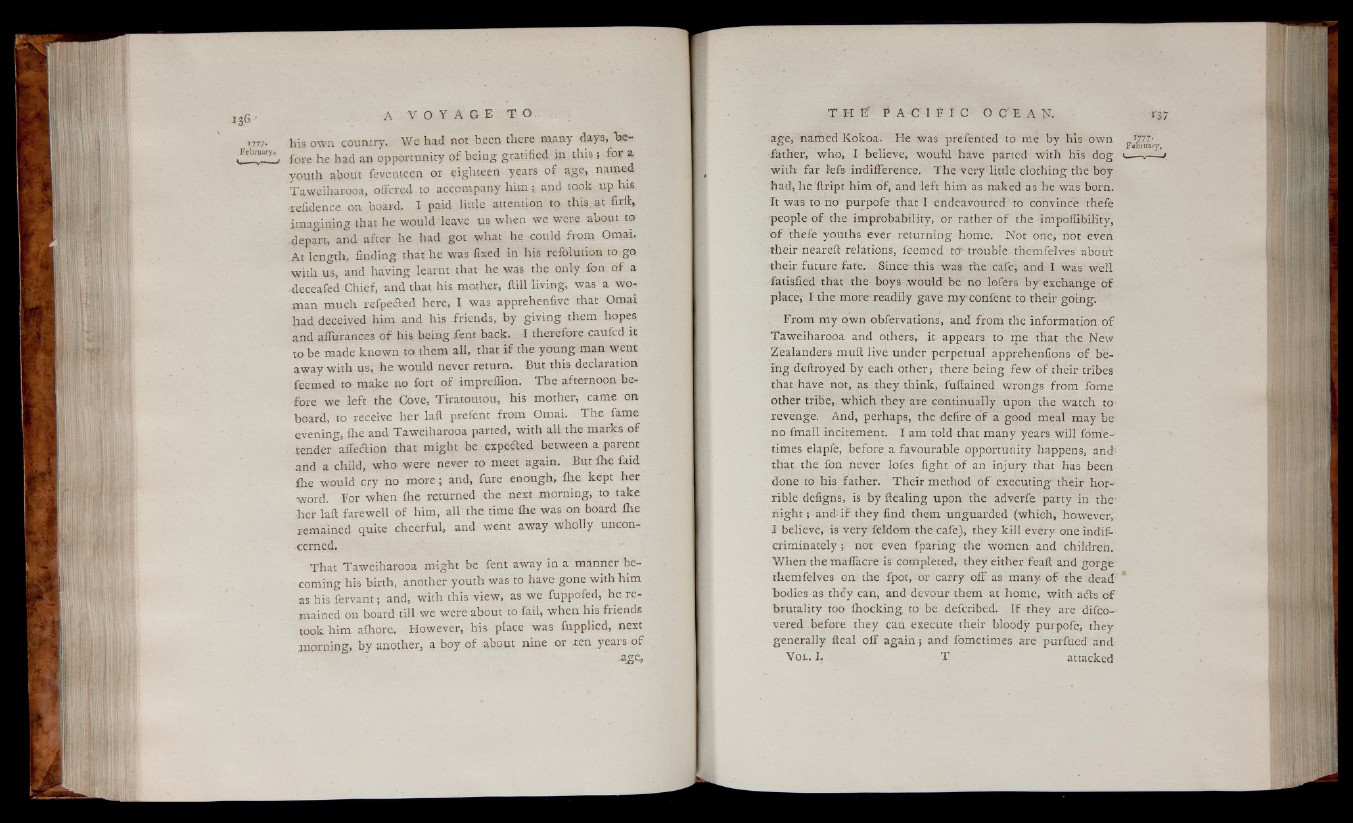
1777. his own country. We had not been there many days, be-
Lrcb,'“!0\ fore he had an opportunity of being gratified in this j for a
youth about feventeen or eighteen years of age, named
Taweiharooa, offered to accompany h im ; and took up his
refidence 011 board. I paid little attention to this, at firft,
imagining that he would leave us when we were about to
.depart, and after he had got what he could from Omai.
At length, finding that he was fixed in his refolution to go.
with us, and having learnt that he was the only fon of a
•deceafed Chief, and that his mother, ftill living, was a woman
much refpe&ed here, I was apprehenfive that Omai
had deceived him and his friends, by giving them hopes
and afluranoes of his being fent back. I therefore caufed it
to be made known to them all, that if the young man went
away with us, he would never return. But this declaration
feemed to make no fort of imprcflion. The afternoon before
we left the Cove, Tiratoutou, his mother, came on
board, to receive her laft prefent from Omai. The fame
evening, ihe and Taweiharooa parted, with all the marks of
tender affeflion that might be expected between a parent
and a child, who were never to meet again. But ihe faid
ihe would cry no more; and, fure enough, ihe kept her
word. For when ihe returned the next morning, to take
-her laft farewell of him, all the time ihe was on board ihe
remained quite cheerful, and went away wholly unconcerned.
That Taweiharooa might be fent away in a manner becoming
his birth, another youth was to have gone with him
as his fervant; and, with this view, as we fuppofed, he remained
on board till we were about to fail, when his fiiends
took him afhore. However, his place was fupplied, next
morning, by another, a boy of about nine or ten years of
age, named Kokoa. He was prefented to me by his own
father, who, I believe, would have parted with his dog v 5—
with far lefs indifference. The very little clothing the boy
had, heilript him of, and left him as naked as he was born.
It was to no purpofe that I endeavoured to convince thefe
people of the improbability, or rather of the impoflibility,
o f thefe youths ever returning home. Not one; not even
their neareft relations, feemed ter trouble themfelves about
their future fate. Since this was rhe cafe, and I was well
fatisfied that the boys would be no lofers by exchange of
place, I the more readily gave myconfent to their going;
From my own obfervations, and from the information o f
Taweiharooa and others, it appears to me that the New
Zealanders muff live under perpetual apprehenfions of being
deftroyed by each other; there being few of their tribes
that have not, as they think, fufiained wrongs from fome
other tribe, which they are continually upon the watch to
revenge. And, perhaps, the defire of a good meal may be
no fmall incitement. I am told that many years will fom'e-
times elapfe, before a favourable opportunity happens, and;
that the fon never lofes fight of an injury that has been
done to his father. Their method of executing their horrible
defigns, is by Healing upon the adverfe party in the-
night; and if they find them unguarded (which, however,-
I believe, is very feldom the cafe), they kill every one indiscriminately
; not even fparing the women and children.
When the maffacre is completed, they either feaft and gorge
themfelves on the fpot, or carry off as many of the dead
bodies as they can, and devour them at home, with afls of
brutality too fhocking to be defcribed. If they are difco--
vered before they can execute their bloody purpofe, they
generally ileal off again; and fometimes. are purfued' and
Vol. I. T attacked